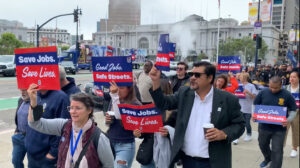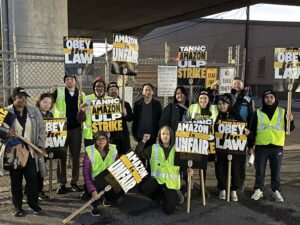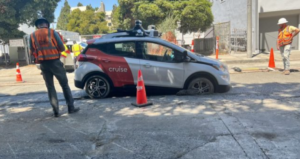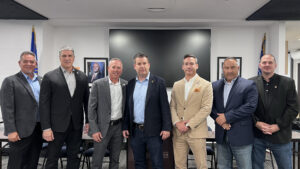2018: The legislative session in review
December 20, 2018By all measures, 2018 was an incredibly successful year for the California Teamsters. We were able to accomplish our biggest legislative priorities, and in a midterm election year, we saw Democratic super-majorities increase in both the Assembly and Senate. Teamster-backed candidates also largely prevailed in their state and congressional races. With super-majorities in both houses of the Legislature, we are well-positioned for 2019.
Below are some of our most important accomplishments this year.
Ending Worker Misclassification in the Ports
Our most pressing legislative accomplishment this year was the passage and enactment of SB 1402 (Lara), co-sponsored by the California Labor Federation. Part of our ongoing Port Campaign, SB 1402 creates a “joint liability” standard for big-box shippers who contract out with port drayage companies using misclassified drivers. By putting financial and legal pressure on the shippers, we believe that SB 1402 will help end misclassification in the ports, affecting up to 25,000 workers in the port trucking industry.
Hollywood Tax Credit
With the help of our partners in the entertainment industry, we were able to extend the state’s film incentive tax credit until 2025. The measure, enacted as part of the state budget, will maintain the $330 million in annual tax credits available for productions that film in California. This is a decisive victory for Teamster members in Hollywood, where filmmakers can now recoup as much as 25% of their spending on crew salaries. An extended film tax credit will help keep jobs in California, and within a highly-unionized industry.
Dynamex
In late April, the California Supreme Court issued an historic ruling in Dynamex Operations West Inc. v. Superior Court. The unanimous decision creates a new, stronger test to protect workers from misclassification as independent contracts. Dynamex is possibly the most important pro-labor decision within recent memory and will affect millions of misclassified California workers, particularly those employed in the “gig economy.”
Almost instantly, the California Chamber of Commerce and other monied-interests flooded the Capitol looking to invalidate the decision by their own legislative solution. Thanks to a successful Dynamex lobby day organized by Joint Council 7 and the State Building Trades, we were able to stop a last-minute effort to gut the Dynamex decision. In 2019, we expect the fight to preserve the Dynamex decision will be back and it will be bloody.
Enhancing Workers’ Compensation
In 2018, we managed to get AB 553 (Daly) all the way to the Governor’s Desk. AB 553 would’ve required the Director of the Division of Workers’ Compensation to pay out a lump sum of $120 million to permanently disabled workers. Unfortunately, Governor Brown vetoed the bill. We are hoping to resolve the issue with the Newsom administration.
Support for an Oakland Athletics Stadium Project
Joined by a coalition of unions, we supported AB 734 (Bonta), which removes administrative hurdles for the creation of a baseball stadium in Oakland. The A’s already have project labor agreements in place with the Teamsters and the building trades. A new stadium will create high-paying jobs for Joint Council 7 members and other workers across the Bay Area.
Taxing Autonomous Vehicles
The passage of AB 1184, by Assembly Member Phil Ting, creates a tax on every automated vehicle originating in or entering San Francisco County, including those operated by companies like Uber and Lyft. Given the increased presence of driverless vehicles in the Bay Area, we believe that additional taxation is necessary to combat strain on public roads as well any potential worker displacement.
Merit Salary Step Increases Across the CSU System
We are very pleased with the passage of AB 1231 by Assembly Member Shirley Weber. AB 1231 restores merit-based salary step increases to “support staff employees working in the CSU system.”
Support staff employees were the last remaining state workers without merit-based salary step increases. This is a huge victory for Local 2010 as well as hard-working CSU workers across the state.
Support for “Me Too” Movement Bills
2018 was a big year for bills confronting pervasive sexual harassment in workplaces across the state. The Teamsters supported and advocated for numerous bills born out of the “Me Too” movement.
Although Governor Brown ultimately vetoed AB 3080 (Gonzalez-Fletcher), which would have prohibited arbitration clauses in employment contracts for sexual harassment claims, we prevailed on a package of other “Me Too” bills. These bills created new sexual harassment training standards, ended secret settlements at the plaintiffs’ option, and extended the statute of limitations for plaintiffs to file sexual harassment claims under California’s Fair Employment and Housing Act. Thanks to these efforts, California now has the strongest sexual harassment prevention laws in the country.
Support for California’s “Net Neutrality” Law
We joined a coalition of organized labor groups to support SB 822, Senator Scott Wiener’s “net neutrality” bill. Last year, the Trump Administration repealed President Obama’s 2015 federal net neutrality order, opening up the internet to price manipulation by cable and telecommunications providers. SB 822 restores net neutrality to California, ensuring the state has the most open internet access in the country. In an age where labor organizing is increasingly done online, it’s important that telecommunications giants can’t suppress communication between workers during their free time.
Increased Transparency for Economic Subsidies
We supported AB 2853 (Medina), one of the Labor Federation’s sponsored bills. AB 2853 would have required local agencies to hold public hearings on any economic subsidies awarded to companies like Amazon. These subsidies are meant to incentivize corporations into moving distribution or production warehouses into communities, but often result in low-paid work that undermines the local economy and pollutes the environment. Unfortunately, the bill was vetoed by Governor Brown. The Labor Federation is looking at running the bill again in 2019.
2018: The legislative session in review
By all measures, 2018 was an incredibly successful year for the California Teamsters. We were able to accomplish our biggest legislative priorities, and in a midterm election year, we saw Democratic super-majorities increase in both the Assembly and Senate. Teamster-backed candidates also largely prevailed in their state and congressional races. With super-majorities in both houses of the Legislature, we are well-positioned for 2019.
Below are some of our most important accomplishments this year.
Ending Worker Misclassification in the Ports
Our most pressing legislative accomplishment this year was the passage and enactment of SB 1402 (Lara), co-sponsored by the California Labor Federation. Part of our ongoing Port Campaign, SB 1402 creates a “joint liability” standard for big-box shippers who contract out with port drayage companies using misclassified drivers. By putting financial and legal pressure on the shippers, we believe that SB 1402 will help end misclassification in the ports, affecting up to 25,000 workers in the port trucking industry.
Hollywood Tax Credit
With the help of our partners in the entertainment industry, we were able to extend the state’s film incentive tax credit until 2025. The measure, enacted as part of the state budget, will maintain the $330 million in annual tax credits available for productions that film in California. This is a decisive victory for Teamster members in Hollywood, where filmmakers can now recoup as much as 25% of their spending on crew salaries. An extended film tax credit will help keep jobs in California, and within a highly-unionized industry.
Dynamex
In late April, the California Supreme Court issued an historic ruling in Dynamex Operations West Inc. v. Superior Court. The unanimous decision creates a new, stronger test to protect workers from misclassification as independent contracts. Dynamex is possibly the most important pro-labor decision within recent memory and will affect millions of misclassified California workers, particularly those employed in the “gig economy.”
Almost instantly, the California Chamber of Commerce and other monied-interests flooded the Capitol looking to invalidate the decision by their own legislative solution. Thanks to a successful Dynamex lobby day organized by Joint Council 7 and the State Building Trades, we were able to stop a last-minute effort to gut the Dynamex decision. In 2019, we expect the fight to preserve the Dynamex decision will be back and it will be bloody.
Enhancing Workers’ Compensation
In 2018, we managed to get AB 553 (Daly) all the way to the Governor’s Desk. AB 553 would’ve required the Director of the Division of Workers’ Compensation to pay out a lump sum of $120 million to permanently disabled workers. Unfortunately, Governor Brown vetoed the bill. We are hoping to resolve the issue with the Newsom administration.
Support for an Oakland Athletics Stadium Project
Joined by a coalition of unions, we supported AB 734 (Bonta), which removes administrative hurdles for the creation of a baseball stadium in Oakland. The A’s already have project labor agreements in place with the Teamsters and the building trades. A new stadium will create high-paying jobs for Joint Council 7 members and other workers across the Bay Area.
Taxing Autonomous Vehicles
The passage of AB 1184, by Assembly Member Phil Ting, creates a tax on every automated vehicle originating in or entering San Francisco County, including those operated by companies like Uber and Lyft. Given the increased presence of driverless vehicles in the Bay Area, we believe that additional taxation is necessary to combat strain on public roads as well any potential worker displacement.
Merit Salary Step Increases Across the CSU System
We are very pleased with the passage of AB 1231 by Assembly Member Shirley Weber. AB 1231 restores merit-based salary step increases to “support staff employees working in the CSU system.”
Support staff employees were the last remaining state workers without merit-based salary step increases. This is a huge victory for Local 2010 as well as hard-working CSU workers across the state.
Support for “Me Too” Movement Bills
2018 was a big year for bills confronting pervasive sexual harassment in workplaces across the state. The Teamsters supported and advocated for numerous bills born out of the “Me Too” movement.
Although Governor Brown ultimately vetoed AB 3080 (Gonzalez-Fletcher), which would have prohibited arbitration clauses in employment contracts for sexual harassment claims, we prevailed on a package of other “Me Too” bills. These bills created new sexual harassment training standards, ended secret settlements at the plaintiffs’ option, and extended the statute of limitations for plaintiffs to file sexual harassment claims under California’s Fair Employment and Housing Act. Thanks to these efforts, California now has the strongest sexual harassment prevention laws in the country.
Support for California’s “Net Neutrality” Law
We joined a coalition of organized labor groups to support SB 822, Senator Scott Wiener’s “net neutrality” bill. Last year, the Trump Administration repealed President Obama’s 2015 federal net neutrality order, opening up the internet to price manipulation by cable and telecommunications providers. SB 822 restores net neutrality to California, ensuring the state has the most open internet access in the country. In an age where labor organizing is increasingly done online, it’s important that telecommunications giants can’t suppress communication between workers during their free time.
Increased Transparency for Economic Subsidies
We supported AB 2853 (Medina), one of the Labor Federation’s sponsored bills. AB 2853 would have required local agencies to hold public hearings on any economic subsidies awarded to companies like Amazon. These subsidies are meant to incentivize corporations into moving distribution or production warehouses into communities, but often result in low-paid work that undermines the local economy and pollutes the environment. Unfortunately, the bill was vetoed by Governor Brown. The Labor Federation is looking at running the bill again in 2019.





